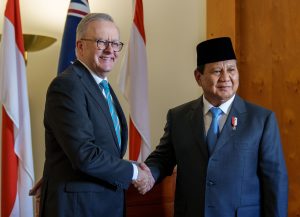Indonesia has agreed to return to Australia the five remaining members of the so-called “Bali Nine” drug smuggling ring who are currently serving life sentences, senior government officials said over the weekend.
On Friday, The Australian newspaper quoted Yusril Ihza Mahendra, the coordinating minister for law, human rights, immigration, and correctional institutions, saying President Prabowo Subianto had “approved the steps” to settle the matter. He said that the transfer was expected to be done next month.
Law Minister Supratman Andi Agtas subsequently told several media outlets that Prabowo had agreed to the repatriation in principle. However, the details were yet to be worked out, given that the two nations do not have a prisoner swap arrangement. It was likely that in return, Jakarta would seek the repatriation of Indonesian prisoners held in Australia, he added, although this was disputed by some Australian officials.
The Guardian quoted Supratman as saying that the remaining members of the Bali Nine would “hopefully” be home by the end of the year, although the president would have the final word. “It’s based on humanitarian grounds and also about good relations between Australia and Indonesia,” he added.
Scott Rush, Matthew Norman, Si-Yi Chen, Martin Stephens, and Michael Czugaj were among the nine Australians arrested for attempting to smuggle 8.3 kilograms of heroin into Australia from the island of Bali. They are currently serving life sentences in prisons on the islands of Bali and Java.
Australia’s Prime Minister Anthony Albanese raised the issue of their repatriation during a meeting with Indonesia’s President Prabowo Subianto on the sidelines of the APEC Summit in Peru earlier this month, Australian Assistant Treasurer Stephen Jones said in a press conference on Saturday. He reportedly also discussed the five Australians with Prabowo’s predecessor, Joko Widodo, whose term ended in October. The Albanese government says it is still discussing the details of the prisoners’ repatriation.
The announcement came less than a week after the Philippines announced that Mary Jane Veloso, a Filipino woman on death row for drug trafficking in a separate case, would be allowed to serve the rest of her sentence in her home country. Indonesia confirmed the arrangement. Veloso, now 39, has been on death row in Indonesia since her arrest for heroin trafficking in Yogyakarta in 2010.
The mother of two enjoyed a last-minute reprieve in 2015, when she was scheduled to be executed along with eight other drug convicts at Nusa Kambangan prison off the coast of Java. These included Andrew Chan and Myuran Sukumaran, the ringleaders of the “Bali Nine.” Of the remaining two members of “Bali Nine,” Tan Duc Than Nguyen died of cancer in June 2018, and the sole female member of the group, Renae Lawrence, was released and deported to Australia in November 2018.
The Albanese government has now enjoyed considerable success in securing the release of Australian nationals held in overseas prisons. These included the economist Sean Turnell, who was released by Myanmar’s military junta in November 2022, journalist Cheng Lei, who was freed from prison in China in October 2023, and WikiLeaks founder Julian Assange, who flew home to Australia in June after his release from prison in the United Kingdom.
There is a lot that needs to happen before the five Australians return home – the prisoners’ release has already become the subject of political sniping by Albanese’s opponents, who have demanded that he divulge the details of its agreement with the Indonesian government – and there will almost certainly be conditions attached to their return. As in Veloso’s case, the Indonesian government will expect its Australian counterparts to respect the Indonesian court verdicts. Appearing on Sky News yesterday, Special Minister of State Don Farrell said that the prisoners would likely not be released. “They would continue to serve their sentence, except they’re serving them in Australia,” Farrell said.
However, the fact that the new Indonesian government has approved repatriation deals for both Veloso and the remaining “Bali Nine” members could be a sign that it intends to take a more flexible approach to foreigners serving long drug-related sentences in Indonesian prisons. These compromises could perhaps be interpreted as a low-cost gesture of friendship to longstanding partners, on the part of a leader who is expected to take a much more active interest in foreign affairs than his predecessor. At the same time, Jakarta has given no sign that it plans to slacken its notoriously severe drug laws.
































